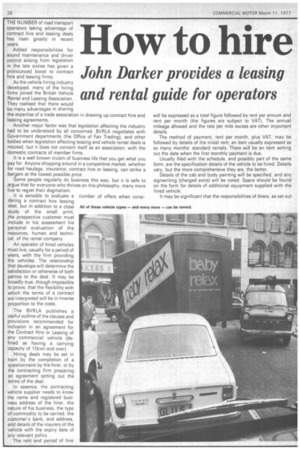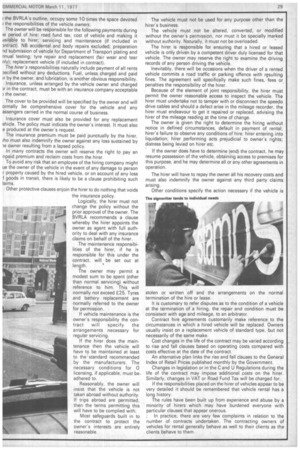How to hire
Page 32

Page 33

If you've noticed an error in this article please click here to report it so we can fix it.
THE NUMBER of road transport operators taking advantage of contract hire and leasing deals has risen greatly in recent years.
Added responsibilities for sound maintenance and driver control arising from legislation in the late sixties has given a pronounced boost to contract hire and leasing firms.
As the vehicle hiring industry developed, many of the hiring firms joined the British Vehicle Rental and Leasing Association. They realised that there would be many advantages in sharing the expertise of a trade association in drawing up contract hire and leasing agreements.
Another major factor was that legislation affecting the industry had to be understood by all concerned. BVRLA negotiates with Government departments (the Office of Fair Trading), and other bodies when legislation affecting leasing and vehicle rental deals is mooted, but it does not concern itself as an association, with the domestic contracts of member firms.
It is a well known truism of business life that you get what you pay for. Anyone shopping around in a competitive market, whether for road haulage, insurance, contract hire or leasing, can strike a bargain at the lowest possible price.
Some people regularly do business this way, but it is safe to argue that for everyone who thrives on this philosophy, many more live to regret their dogmatism.
An operator of hired vehicles must live, usually for a period of years, with the firm providing the vehicles. The relationship that develops will determine the satisfaction or otherwise of both parties to the deal. It may be broadly true, though impossible to prove, that the flexibility with which the terms of a contract are interpreted will be in inverse proportion to the costs.
The BVR LA publishes a useful outline of the clauses and provisions recommended for inclusion in an agreement for the Contract Hire or Leasing of any commercial vehicle (defined as having a carrying capacity of 1 Ocwt and over).
Hiring deals may be set in train by the completion of a questionnaire by the hirer, or by the contracting firm preparing an agreement setting out the terms of the deal.
In essence, the contracting vehicle supplier needs to know the name and registered business address of the hirer, the nature of his business, the type of commodity to be carried, the customer's bank, and address, and details of the insurers of the vehicle with the expiry date of any relevant policy.
The rent and period of hire will be expressed as a total figure followed by rent per annum and rent per month (the figures are subject to VAT). The annual mileage allowed and the rate per mile excess are other important details.
The method of payment, rent per month, plus VAT, may be followed by details of the initial rent, an item usually expressed as so many months' standard rentals. There will be an item setting out the date when the first monthly payment is due.
Usually filed with the schedule, and possibly part of the same form, are the specification details of the vehicle to be hired. Details vary, but the more comprehensive they are, the better. Details of the cab and body painting will be specified, and any signwriting (charged extra) will be noted. Space should be found on the form for details of additional equipment supplied with the hired vehicle.
It may be significant that the responsibilities of hirers, as set out
the BVRLA's outline, occupy some 10 times the space devoted ) the responsibilities of the vehicle owners.
The owner wil I be responsible for the following payments during le period of hire: road fund tax; cost of vehicle and making it vailable to hirer; servicing and maintenance (if included in )ntract). NB accidental and body repairs excluded; preparation id submission of vehicle for Department of Transport plating and nnual testing; tyre repair and replacement (fair wear and tear nly); replacement vehicle (if included in contract).
The hirer's responsibilities naturally include payment of all rents Decified without any deductions. Fuel, unless charged and paid )r by the owner, and lubrication, is another obvious responsibility. Insurance, unless arranged by the vehicle owner and charged )r in the contract, must be with an insurance company acceptable ) the owner.
The cover to be provided will be specified by the owner and will ormally be comprehensive cover for the vehicle and any assengers carried in the normal course of business.
Insurance cover must also be provided for any replacement ehicle. The policy must indicate the owner's interest. It must also e produced at the owner's request.
The insurance premium must be paid punctually by the hirer, rho must also indemnify the owner against any loss sustained by le owner resulting from a lapsed policy.
In many contracts the owner will reserve the right to pay an npaid premium and reclaim costs from the hirer.
To avoid any risk that an employee of the hiring company might ue the owner of the vehicle in the event of any damage to person r property caused by the hired vehicle, or on account of any loss f goods in transit, there is likely to be a clause prohibiting such laims.
Other protective clauses enjoin the hirer to do nothing that voids the insurance policy.
Logically, the hirer must not change the policy without the prior approval of the owner. The BVRLA recommends a clause whereby the hirer appoints the owner as agent with full authority to deal with any insurance claims on behalf of the hirer.
The maintenance responsibilities of the hirer, if he is responsible for this under the contract, will be set out at length.
The owner may permit a modest sum to be spent (other than normal servicing) without reference to him. This will normally not exceed £25. Tyres and battery replacement are normally referred to the owner for permission.
If vehicle maintenance is the owner's responsibility the con tract will specify the arrangements necessary for regular servicing.
If the hirer does the maintenance then the vehicle will have to be maintained at least to the standard recommended by the manufacturers. The necessary conditions for 0 licensing, if applicable, must be. adhered to.
Reasonably, the owner will insist that the vehicle is not taken abroad without authority. If trips abroad are permitted, then the terms permitting this will have to be complied with.
Most safeguards built in to the contract to protect the owner's interests are entirely reasonable. The vehicle must not be used for any purpose other than the hirer's business.
The vehicle must not be altered, converted, or modified without the owner's permission, nor must it be specially marked without authority. Naturally, it must not be overloaded.
The hirer is responsible for ensuring that a hired or leased vehicle is only driven by a competent driver duly licensed for that vehicle. The owner may reserve the right to examine the driving records of any person driving the vehicle.
Inevitably, there will be occasions when the driver of a rented vehicle commits a road traffic or parking offence with r9sulting fines. The agreement will specifically make such fines, • fees or penalties the responsibility of the hirer.
Because of the element of joint responsibility, the hirer must permit the owner reasonable access to inspect the vehicle. The hirer must undertake not to tamper with or disconnect the speedo drive cables and should a defect arise in the mileage recorder, the hirer must endeavour to get it repaired or replaced, advising the hirer of the mileage reading at the time of change.
The owner is given the right to determine the hiring without notice in defined circumstances, default in payment of rental; hirer's failure to observe any conditions of hire; hirer entering into liquidation; hirer performing acts prejudicial to owner's rights; distress being levied on hirer etc.
If the owner does have to determine (end) the contract, he may resume possession of the vehicle, obtaining access to premises for this purpose, and he may determine all or any other agreements in operation.
The hirer will have to repay the owner all his recovery costs and must also indemnify the owner against any third party claims arising.
Other conditions specify the action necessary if the vehicle is stolen or written off and the arrangements on the normal termination of the hire or lease.
It is customary to refer disputes as to the condition of a vehicle at the termination of a hiring, the repair and condition must be consistent with age and mileage, to an arbitrator.
Contract hire agreements customarily make reference to the circumstances in which a hired vehicle will be replaced. Owners usually insist on a replacement vehicle of standard type, but not necessarily of the same make.
Cost changes in the life of the contract may be varied according to rise and fall clauses based on operating costs compared with costs effective at the date of the contract.
An alternative plan links the rise and fall clauses to the General Index of Retail Prices published monthly by the Government.
Changes in legislation or in the C and U Regulations during the life of the contract may impose additional costs on the hirer. Similarly, changes in VAT or Road Fund Tax will be charged for.
If the responsibilities placed on the hirer of vehicles appear to be very detailed it should be remembered that vehicle rental has a long history.
The rules have been built up from experience and abuse by a minority of hirers which may have burdened everyone with particular clauses that appear onerous.
; In practice, there are very few complaints in relation to the number of contracts undertaken. The contracting owners of vehicles for rental generally behave as well to their clients as the clients behave to them.






















































































































